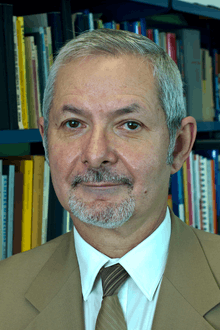Cristian S. Calude
| Cristian S. Calude | |
|---|---|
 Portrait of Professor Cristian S. Calude. Taken by Godfrey Boehnke on 20 April 2011 at the University of Auckland, Auckland, New Zealand. | |
| Born |
21 April 1952 Galați, Romania |
| Residence | New Zealand |
| Nationality | Romanian |
| Alma mater | University of Bucharest |
| Known for | Algorithmic Information Theory and Quantum Theory contributions |
| Scientific career | |
| Fields | Mathematician |
| Institutions | University of Auckland, Academia Europaea |
| Doctoral advisor | Solomon Marcus |
| Doctoral students | Marius Zimand, Cezar Campeanu, Michael Stay, Alastair Abbott |
Cristian Sorin Calude (born 21 April 1952) is a Romanian-New Zealander mathematician and computer scientist.[1] He graduated from the National College Vasile Alecsandri in Galați, and the University of Bucharest and was student of Grigore C. Moisil and Solomon Marcus[2]. He is currently chair professor at the University of Auckland,[3] New Zealand and also the founding director of the Centre for Discrete Mathematics and Theoretical Computer Science.[4] Visiting Professor in many universities in Europe, North and South America, Australasia, South Africa, including Monbusho Visiting Professor, JAIST, 1999 and Visiting Professor ENS, Paris, 2009, École Polytechnique, Paris, 2011; Visiting Fellow, Isaac Newton Institute for Mathematical Sciences, 2012; Guest Professor, Sun Yat-sen University, Guangzhou, China, 2017–2020. Former professor at the University of Bucharest. Author or co-author of more than 270 research articles and 8 books[5]. Cited by more than 550 authors.[6] Research in algorithmic information theory, quantum computing, discrete mathematics and history and philosophy of computation[7].
In 2017, together with Sanjay Jain, Bakhadyr Khoussainov, Wei Li, and Frank Stephan, he announced an algorithm for deciding parity games in quasipolynomial time.[8] Their result was presented at the Symposium on Theory of Computing 2017[9] and won a Best Paper Award[10].
Articles
- C. S. Calude, G. Longo. The deluge of spurious correlations in big data, Foundations of Science]] 22, 3, (2016), 595–612.
- A. Abbott, C. S. Calude, K. Svozil. A variant of the Kochen-Specker theorem localising value indefiniteness, Journal of Mathematical Physics 56, 102201 (2015), doi.org/10.1063/1.4931658.
- C. S. Calude, E. Calude, M. J. Dinneen. Adiabatic Quantum Computing Challenges, ACM SIGACT News 46,1 (2015), 40–61.
- A. Abbott, C. S. Calude, K. Svozil. Value-indefinite observables are almost everywhere, Physical Review A 89, 3 (2014), 032109-032116.
- C. S. Calude, M. J. Dinneen, Monica Dumitrescu, K. Svozil. Experimental evidence of quantum randomness incomputability, Physical Review A 82, 022102 (2010), 1—8.
- C. S. Calude, M. A. Stay. Most programs stop quickly or never halt, Advances in Applied Mathematics 40 (2008), 295—308.
Books
- C. S. Calude (ed.) The Human Face of Computing, Imperial College Press, London, 2015. 21st Annual Best of Computing, The Notable Books and Articles List for 2016, Computing Reviews, July 2017.
- C. S. Calude (ed.) Randomness & Complexity, From Leibniz to Chaitin, World Scientific, Singapore, 2007.
- C. S. Calude. Information and Randomness: An Algorithmic Perspective, 2nd Edition, Revised and Extended, Springer-Verlag, Berlin, 2002.
- C. S. Calude, G. Păun.Computing with Cells and Atoms, Taylor & Francis Publishers, London, 2001.
- C. Calude. Theories of Computational Complexity, North-Holland, Amsterdam, 1988.
Distinctions and Prizes
- "Computing Reviews Award", Association for Computing Machinery, New York City, 1986.
- "Gheorghe Lazar" Mathematics Prize, Romanian Academy, Romania, 1988.
- Excellence in Research Award, University of Bucharest, Romania, 2007.
- Dean's Award for Excellence in Teaching, University of Auckland, 2007.
- Hood Fellow, 2008–2009.
- Member of the Academia Europaea, 2008.[11]
Notes
- ↑ Publications at DPLB
- ↑ Calude CV
- ↑ Staff profile page at the departement of computer science
- ↑ CDMTCS at the University of Auckland, New Zealand
- ↑ Calude's books at Amazon
- ↑ Calude's citations
- ↑ S. Marcus. The art of reaching the age of sixty. In: Dinneen M.J., Khoussainov B., Nies A. (eds) Computation, Physics and Beyond. Lecture Notes in Computer Science, vol 7160. Springer, Berlin, Heidelberg, 1–19.
- ↑ http://www.comp.nus.edu.sg/~sanjay/paritygame.pdf
- ↑ http://acm-stoc.org/stoc2017/STOC2017accepted.pdf
- ↑ STOC Best Paper Award
- ↑ The list of members for Academia Europaea Informatics Section Archived 24 July 2011 at the Wayback Machine.
External links
- Cristian S. Calude at the Mathematics Genealogy Project
- C. S. Calude Home Page
- CDMTCS at the University of Auckland
- Cristian S. Calude member page at Academia Europaea
- "C. S. Calude" Mathematics Regional Contest, National College "Vasile Alecsandri", Galati, Romania
- "Cristian S. Calude 60th Birthday"